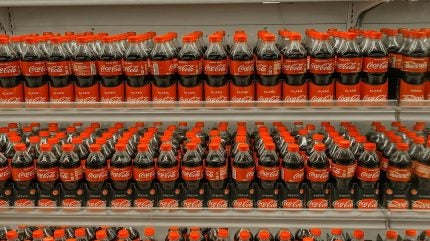
The Coca-Cola Company has completed the transition to 100% recycled plastic for all 500ml bottles in its sparkling beverage portfolio in Canada, the Globe and Mail reported.
This initiative, announced in October last year, excludes the bottle’s caps and labels.

Discover B2B Marketing That Performs
Combine business intelligence and editorial excellence to reach engaged professionals across 36 leading media platforms.
The new bottles, now produced entirely from recycled material, are manufactured by Coke Canada Bottling.
These bottles are manufactured by Coke Canada Bottling across its facilities in Brampton, Calgary, Lachine, and Richmond.
The transition is expected to save 7.6 million pounds of new plastic in 2024 and cut nearly 7,000 tonnes (t) of carbon dioxide (CO₂) emissions annually.
At the time of launching the initiative, Coca-Cola North America sustainability vice-president and general manager Kurt Ritter said: “We hope that transitioning our 500ml sparkling portfolio to 100% recycled plastic will increase the amount of high-quality, food-grade, recycled plastic available in Canada and, ultimately, enable us to offer more of our brands in this sustainable format.”

US Tariffs are shifting - will you react or anticipate?
Don’t let policy changes catch you off guard. Stay proactive with real-time data and expert analysis.
By GlobalDataThis transition is in line with the company’s global World Without Waste goals.
As part of this goal, The Coca-Cola Company pledges to use at least 50% recycled content in its packaging by 2030 and also cut virgin plastic usage.
The transition to recycled plastic is a complex process that involves ensuring the new packaging meets strict health, safety, and consumer desirability standards.
It also requires securing sufficient quantities of recycled polyethylene terephthalate and coordinating with bottling plants to adapt their production lines.
In addition, logistical challenge necessitates collaboration across various stakeholders, according to the company.
Coca-Cola Canada director for Sustainability Capabilities and Planning Mika Unterman was quoted by the Globe and Mail as saying “By announcing our move to recycled bottles, we are signalling to the recycling industry at large how serious we are. These are problems that require collaboration, no one can do this in isolation.”
In January this year, Coca-Cola initiated a trial of label-less packaging for its Sprite brand in the UK, aiming to simplify the recycling process and cut down the use of packaging material.





